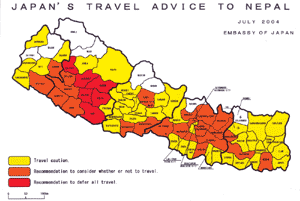 Just when tourist bookings were looking good for this autumn season, news came this week of a strict travel advisory from Japan to its citizens wishing to visit Nepal. Combined with similar advisories from the United States, Australia and the United Kingdom, it has sent a pall of gloom over the industry.
Just when tourist bookings were looking good for this autumn season, news came this week of a strict travel advisory from Japan to its citizens wishing to visit Nepal. Combined with similar advisories from the United States, Australia and the United Kingdom, it has sent a pall of gloom over the industry. The Japanese Embassy in Kathmandu updated its travel advisory, and now recommends prospective Japanese visitors to Nepal reconsider travelling to Kathmandu, Chitwan and Kaski districts. These were the places that were earlier put in Category Two, which meant 'travel with caution'.
The Japanese Embassy has included 19 other districts, most of them in the eastern and far western regions, as places that Japanese tourists should think carefully about before travelling to. It has recommended that all travel plans to six Maoist stronghold districts in the far west should be deferred.
Even though the travel advisories of the US, Australia and the UK are more strongly worded than the Japanese one, travel traders are concerned because they fear Japanese tourists might take it more seriously than has been the case with western countries, whose citizens continue to come to Nepal despite the cautions.
"We are worried because this is the first time the Japanese government has taken its advisory to such an alarming level," said Deepak Mahat, president of Trekking Agents Association of Nepal. "The notice may also make adverse impact in other markets."
Of the roughly 270,000 tourists who came to Nepal by air last year, 20,000 were Japanese-the third largest national group. Worried, travel entrepreneurs got Tourism Minister Deep Kumar Upadhyay to speak to Japanese Ambassador Zenji Kaminaga to see if he could tone down the advisory, but it didn't work. "There is not going to be any change immediately," Shota Kamishima, second secretary at the Japanese Embassy, told us. "We believe that the advisory reflects the situation in different places in Nepal."
Independent observers are puzzled by this sudden Japanese decision, since Japanese nationals have not been singled out by the Maoists as the Americans have. An updated US travel advisory reads: 'The Department of State urges US citizens to defer non-essential travel to Nepal. Maoist supreme commander Prachanda issued a press statement on 1 July, 2004, threatening to use "more violent means" if peace talks with the Government of Nepal are not forthcoming or are unsuccessful. The Embassy has received information that the Maoists may attempt to attack or take actions specifically against US citizens as part of that contingency, particularly in regions of the country under Maoist control.'
The Australian government's notice is almost as bad: 'Australians are advised to defer non-essential travel to Nepal. There is an on-going Maoist insurgency in Nepal. Maoists are present in all districts and violent clashes between government forces and insurgents occur across the country, including in popular trekking and tourist areas. Maoists and political parties call frequent national and local strikes (bandhs), during which most businesses are closed. The lack of transport during bandhs can make travel very difficult, including to and from airports.'
While the foreign missions in Kathmandu say that issuing notices to inform their citizens of what is happening is their duty, tour operators say advisories blow the situation out of proportion. "If you read the US travel advisory, you get the impression that one cannot even walk in the streets in Kathmandu," says Nepal Association of Tour Operators president, Basanta Raj Mishra. "They never mention that not a single tourist has been intentionally targeted in Nepal." In addition, there are many parts of Nepal that are still insurgency-free.
One embassy official told us off the record that there are legal reasons why they have to issue advisories to prevent law suits in case someone somewhere gets caught in conflict. "It is basically to cover our own backsides," he said. Even so, travel experts say the 'objective dangers' of travelling within Nepal have increased because of the indiscriminate use of landmines by both sides and the danger of being caught in crossfire near security bases.
Clearly this is a tricky business for foreign missions. Junior diplomats in some western embassies said that they are supposed to report each and every incident back to their capitals. "For instance, if we update our travel advisory now, we will have to consider the economic blockade the Maoists have announced around the Kathmandu Valley, and we know that it would not do good for the national tourism industry," one embassy official said.
Tourism entrepreneurs say even international tour operators have complaints that the travel advisories are too negative. "British tour operators complained to their government and got the British travel advisory on the web revised," says Mishra.
Interestingly, not all western foreign missions in Kathmandu have sounded the alarm bells warning their citizens not to visit Nepal. The French, always slightly more audacious than the rest, have not issued any such notice. Purushottam Sigdel at the French Embassy told us: "If French people wish to travel to Nepal, we don't tell them not to come. There is no restriction from our side."


